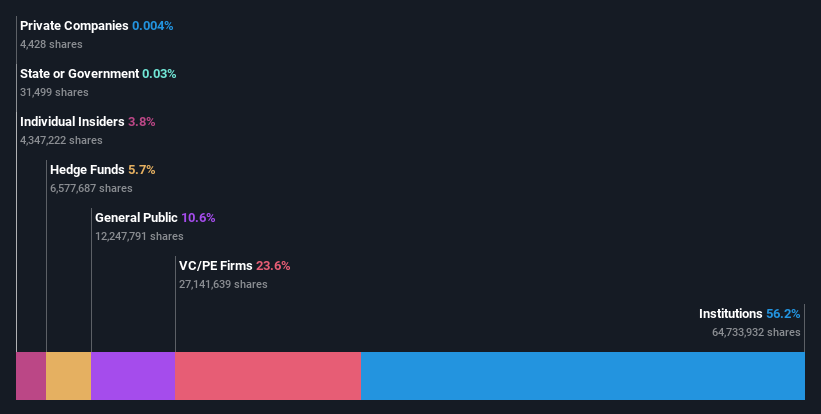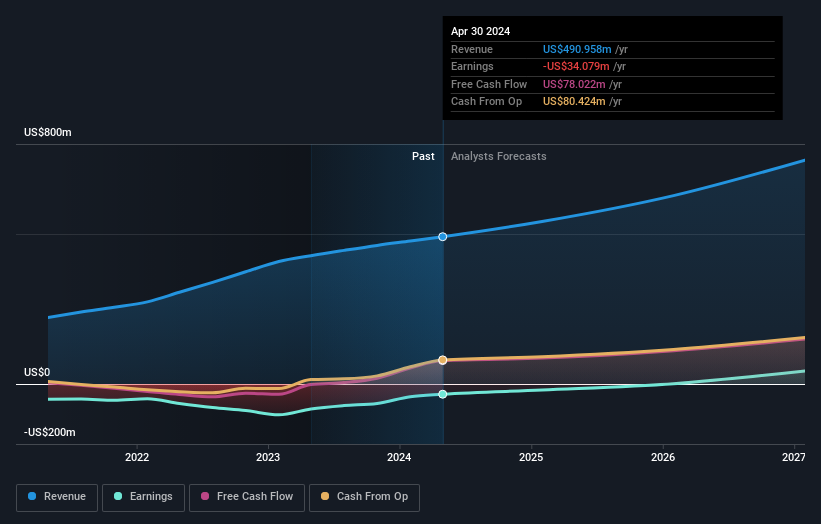- United States
- /
- Software
- /
- NasdaqGS:NCNO
After losing 1.1% in the past year, nCino, Inc. (NASDAQ:NCNO) institutional owners must be relieved by the recent gain
Key Insights
- Institutions' substantial holdings in nCino implies that they have significant influence over the company's share price
- 51% of the business is held by the top 8 shareholders
- Insiders have sold recently
To get a sense of who is truly in control of nCino, Inc. (NASDAQ:NCNO), it is important to understand the ownership structure of the business. With 56% stake, institutions possess the maximum shares in the company. That is, the group stands to benefit the most if the stock rises (or lose the most if there is a downturn).
Institutional investors would appreciate the 3.7% increase in share price last week, given their one-year losses have totalled a disappointing 1.1%.
Let's delve deeper into each type of owner of nCino, beginning with the chart below.
View our latest analysis for nCino

What Does The Institutional Ownership Tell Us About nCino?
Many institutions measure their performance against an index that approximates the local market. So they usually pay more attention to companies that are included in major indices.
We can see that nCino does have institutional investors; and they hold a good portion of the company's stock. This implies the analysts working for those institutions have looked at the stock and they like it. But just like anyone else, they could be wrong. When multiple institutions own a stock, there's always a risk that they are in a 'crowded trade'. When such a trade goes wrong, multiple parties may compete to sell stock fast. This risk is higher in a company without a history of growth. You can see nCino's historic earnings and revenue below, but keep in mind there's always more to the story.

Investors should note that institutions actually own more than half the company, so they can collectively wield significant power. It would appear that 5.7% of nCino shares are controlled by hedge funds. That's interesting, because hedge funds can be quite active and activist. Many look for medium term catalysts that will drive the share price higher. Our data shows that Insight Venture Management, LLC is the largest shareholder with 24% of shares outstanding. The second and third largest shareholders are Kayne Anderson Rudnick Investment Management, LLC and The Vanguard Group, Inc., with an equal amount of shares to their name at 6.2%. In addition, we found that Pierre Naude, the CEO has 1.0% of the shares allocated to their name.
We also observed that the top 8 shareholders account for more than half of the share register, with a few smaller shareholders to balance the interests of the larger ones to a certain extent.
While studying institutional ownership for a company can add value to your research, it is also a good practice to research analyst recommendations to get a deeper understand of a stock's expected performance. There are plenty of analysts covering the stock, so it might be worth seeing what they are forecasting, too.
Insider Ownership Of nCino
The definition of an insider can differ slightly between different countries, but members of the board of directors always count. Company management run the business, but the CEO will answer to the board, even if he or she is a member of it.
Most consider insider ownership a positive because it can indicate the board is well aligned with other shareholders. However, on some occasions too much power is concentrated within this group.
Our most recent data indicates that insiders own some shares in nCino, Inc.. The insiders have a meaningful stake worth US$138m. Most would see this as a real positive. Most would say this shows alignment of interests between shareholders and the board. Still, it might be worth checking if those insiders have been selling.
General Public Ownership
The general public, who are usually individual investors, hold a 11% stake in nCino. While this size of ownership may not be enough to sway a policy decision in their favour, they can still make a collective impact on company policies.
Private Equity Ownership
With a stake of 24%, private equity firms could influence the nCino board. Sometimes we see private equity stick around for the long term, but generally speaking they have a shorter investment horizon and -- as the name suggests -- don't invest in public companies much. After some time they may look to sell and redeploy capital elsewhere.
Next Steps:
While it is well worth considering the different groups that own a company, there are other factors that are even more important. For example, we've discovered 2 warning signs for nCino that you should be aware of before investing here.
But ultimately it is the future, not the past, that will determine how well the owners of this business will do. Therefore we think it advisable to take a look at this free report showing whether analysts are predicting a brighter future.
NB: Figures in this article are calculated using data from the last twelve months, which refer to the 12-month period ending on the last date of the month the financial statement is dated. This may not be consistent with full year annual report figures.
New: Manage All Your Stock Portfolios in One Place
We've created the ultimate portfolio companion for stock investors, and it's free.
• Connect an unlimited number of Portfolios and see your total in one currency
• Be alerted to new Warning Signs or Risks via email or mobile
• Track the Fair Value of your stocks
Have feedback on this article? Concerned about the content? Get in touch with us directly. Alternatively, email editorial-team (at) simplywallst.com.
This article by Simply Wall St is general in nature. We provide commentary based on historical data and analyst forecasts only using an unbiased methodology and our articles are not intended to be financial advice. It does not constitute a recommendation to buy or sell any stock, and does not take account of your objectives, or your financial situation. We aim to bring you long-term focused analysis driven by fundamental data. Note that our analysis may not factor in the latest price-sensitive company announcements or qualitative material. Simply Wall St has no position in any stocks mentioned.
Have feedback on this article? Concerned about the content? Get in touch with us directly. Alternatively, email editorial-team@simplywallst.com
About NasdaqGS:NCNO
nCino
A software-as-a-service company, provides software solutions to financial institutions in the United States, the United Kingdom, and internationally.
Undervalued with adequate balance sheet.
Similar Companies
Market Insights
Community Narratives



